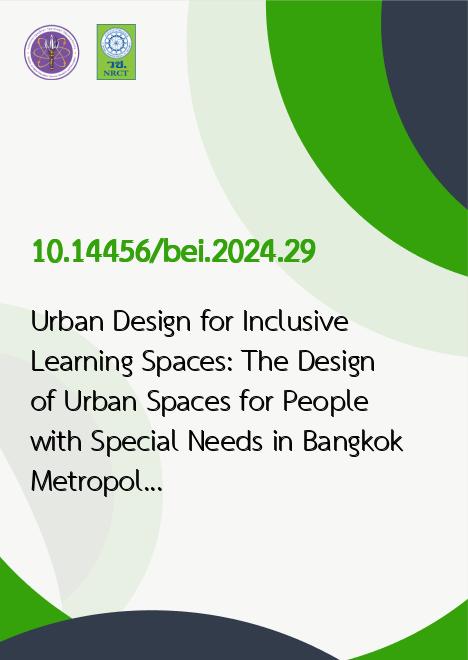
|
Urban Design for Inclusive Learning Spaces: The Design of Urban Spaces for People with Special Needs in Bangkok Metropolis |
|---|---|
| รหัสดีโอไอ | |
| Creator | Sasilak Khayankij |
| Title | Urban Design for Inclusive Learning Spaces: The Design of Urban Spaces for People with Special Needs in Bangkok Metropolis |
| Contributor | Komgrij Thanapet |
| Publisher | คณะสถาปัตยกรรมศาสตร์ |
| Publication Year | 2567 |
| Journal Title | วารสาร สิ่งแวดล้อมสรรค์สร้างวินิจฉัย (Built Environment Inquiry – BEI) |
| Journal Vol. | 23 |
| Journal No. | 3 |
| Page no. | 194-209 |
| Keyword | Bangkok, Inclusive, People with special needs, Urban design, Urban space |
| URL Website | https://www.tci-thaijo.org/index.php/arch-kku |
| Website title | Built Environment Inquiry Journal Faculty of Architecture Khon Kaen University, Thailand |
| ISSN | 2651-1185 |
| Abstract | An inclusive society is crucial for sustainable development. Herein, the aim is to include people with diverse needs such that everyone has the right to freedom of expression, respects humanity, and has the potential for learning and self-development. This study is conducted, using qualitative methods to present guidelines for designing and improving the design of public learning spaces for people with special needs. Eighteen experts were recruited by purposive sampling. A snowball technique was also used whereby one-on-one in-depth interviews were held via an online platform to elicit data. Accordingly, a semi-structured interview was developed. Interview questions were related to each group of experts. Five specialists were skilled in special educational psychology or psychiatry. Five specialists were urban design and landscape architects. Three officers were attached to the social development department along with three parents and two people with special needs. After the interview, datas were transcribed verbatim, then analyzed, using the content analysis technique. The findings were reread several times before proposing guidelines. The challenges that face Bangkok Metropolis to create public learning spaces that can support people with special needs are numerous. Demands are many, including the misconcept of an inclusive city for all, lack of basic safety in accessing and using public spaces plus a lack of landscape architects who understand people with special needs. Guidelines are needed to design friendly spaces that support learning for people with special needs. Moreover, society has to understand and accept the differences in others. Changing the mindset of society from “social welfare” to “welfare state” drives the mechanism of “being part of the decision making process” to “participatory decision making”. Besides, experts must be hired who are skilled in special education and can integrate social agencies to support the quality of life for people with special needs. It is vital that the Bangkok administration provide more independence to local sectors to carry out policies required in their neighbourhoods. |